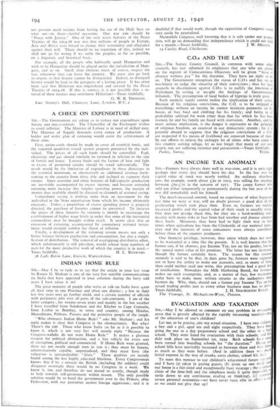AN INCOME TAX ANOMALY
Sia,—Farmers have always done well in war-time, and it is only right perhaps that every dog should have his day. In the last war the capital value of stock was nearly trebled. An ordinary shorthorn cow, for example, worth about £20 in 1913, was selling for anything between £6o-£7o in the autumn of 1917. The canny farmer who sold out either temporarily or permanently during the last year of the war did remarkably well for himself.
The much-increased control, based on experience of what happened last time we were at war, will no doubt prevent a good deal of the profiteering which took place then. Even so, farmers are making increased profits and the capital value of their stock is steadily rising. One does not grudge them this, for they are a hard-working com- munity with many risks to face from bad weather and disease amongst their herds. Moreover, they have had to fight their way in lean times when agriculture has been the Cinderella of our national indus- tries and the interests of town consumers were always considered before those of the country producers.
One financial privilege, however, they enjoy which does not seem to be warranted at a time like the present. It is well known that the farmer can, if he chooses, pay Income Tax, not on his profits, but on the annual rental value of his premises. The latter has not increased, though the former certainly have. The reason for this taxation anomaly is said to be that, in days gone by, farmers were supposed not to have the ability to make out accounts, and, as many of them then could neither read nor write, this presumption had a good deal of justification. Nowadays the Milk Marketing Board, for instance, makes no such assumption, and, as a matter of fact, few tradesmen today have to make more written returns to the authorities than farmers do. Why, then, should not a fanner pay Income Tax on his actual trading profits just as every other business man has to do?—






























 Previous page
Previous page